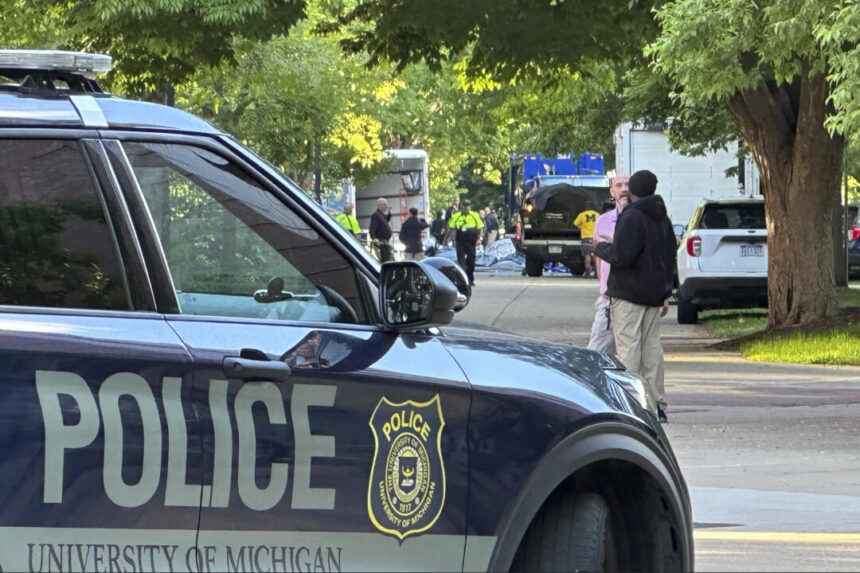ANN ARBOR, Mich.—Police dispersed a pro-Palestinian encampment at the University of Michigan in the early hours of Tuesday, citing concerns for public safety. This action came shortly after demonstrators escalated their protest by placing fake body bags on the lawn of a school official.
Officers in protective gear removed around 50 individuals from the Diag, a historic site known for hosting campus protests. Videos posted online showed police using what appeared to be an irritant to disperse the crowd, leading to their retreat.
At least four individuals were arrested, according to university spokeswoman Kim Broekhuizen.
The encampment was established on April 22, close to the end of the school year and just before families arrived for spring commencement. Posters taunting President Santa Ono and other officials were also exhibited.
Following the clearance of the camp, nearby buildings such as the undergraduate and graduate libraries were closed, and students looking to study were turned away by the police.
In a statement, President Ono stated that the encampment posed a safety hazard due to overloaded power sources and open flames. Organizers had reportedly failed to comply with requests for necessary changes after a fire marshal inspection.
“The disregard for safety directives was only the latest in a series of troubling events centered on an encampment that has always violated the rules that govern the Diag—especially the rules that ensure the space is available to everyone,” Ono said.
The protesters have urged the school’s endowment to divest from companies linked to Israel. However, the university maintains that it does not have direct investments in such companies and only has less than $15 million invested in funds that may include Israeli companies, which is less than 0.1% of the total endowment.
“There’s nothing to discuss. That matter is closed,” stated Sarah Hubbard, the Chair of the Board of Regents, last week.
On May 15, a group of 30 protesters visited Hubbard’s residence and placed red-stained sheets resembling body bags on her lawn. They chanted slogans and banged drums using a bullhorn.
Individuals with face coverings also left demands at the doors of other board members.
“This behavior is a direct result of our failure to address antisemitism and leads right to the doorstep of my home,” remarked board member Mark Bernstein, a lawyer from Detroit, during a Regents meeting last Thursday. “Who’s next? When and where will this end? As a Jewish person, I know the answers to these questions as our history is fraught with tragedies that we are at risk of repeating. Enough is enough.”
Across the country, students and others have established tent encampments on various campuses to pressure universities to sever financial ties with Israel. Tensions regarding the conflict have been high on campuses since the autumn, with protests escalating after a police crackdown on an encampment at Columbia University on April 18. Nationwide, arrests at campuses have surpassed 3,000.
Drexel University in Philadelphia issued a warning on Monday to clear an encampment, resulting in a campus lockdown, virtual classes, and police monitoring the protest.
Many Drexel employees were instructed to work remotely. President John Fry emphasized on Monday that the encampment had disrupted campus operations and could not be allowed to continue.








